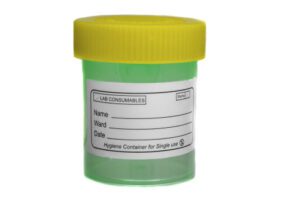by Janet Figarra, DVM
When you are rudely alerted to the sound or smell of your pet’s stool in the house, your first thought might not be, “I need to save some of this!” But please do, as the color, consistency, frequency and volume of diarrhea is very helpful in determining the underlying cause.

At least once a year we recommend an intestinal parasite screen, also known as a ‘fecal’. Approximately 1 gram of stool is suspended in solution then centrifuged, which forces parasite eggs to the top of a test tube. Here eggs adhere to a glass coverslip; our lab technician can then microscopically identify various intestinal worms that may infest your pet.
For diarrhea, parasites are often our first suspicion. But if no parasites are found, the character of the stool can still give a lot of information. Blood or mucus in stool suggests inflammation. Color of stool can help determine cause. Volume and frequency help determine if the inflammation is in small intestine, large intestine, or both.
We’ll need some history to further guide us on our quest for a cause. What are you feeding? Is the diarrhea intermittent, or every time? Any urgency or straining? And so on. No matter what the history, we want to see it with our own eyes, so bring us your dog’s poop!
Recent Posts
About Us
Ann Arbor Animal Hospital is a locally-owned animal hospital operating for over 90 years in Ann Arbor, MI.
